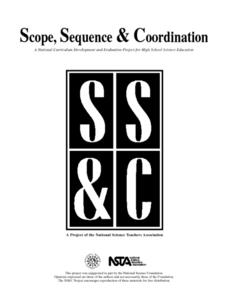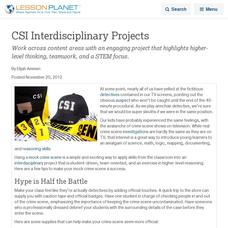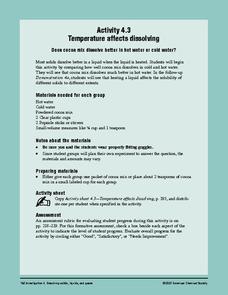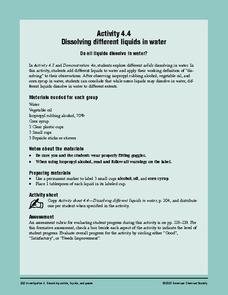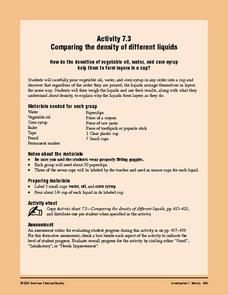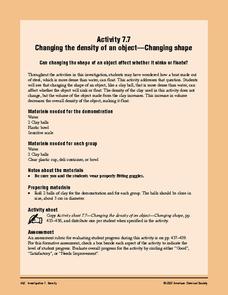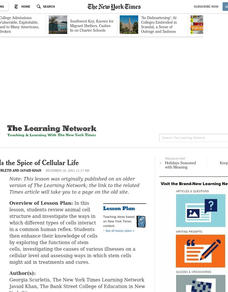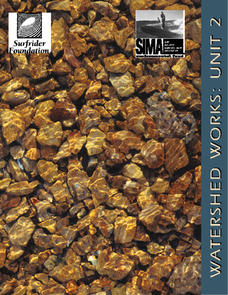Curated OER
Open-Ended Questions
Middle schoolers identify a topic for an open-ended question and evaluate the question. After developing ideas that lead to inquire, they investigate and research this topic on the Internet, and then create an iMovie.
Curated OER
Laws of Motion
Do you need some new ideas for teaching Newton's Laws of Motion? This series of activities will spring your curriculum to life! Choose from five activities to demonstrate or have your science stars perform. As a result, they will have...
Curated OER
Radioactivity, Time, and Age
Four activities demonstrate the chain reaction of nuclear fission to your physical science fans: falling dominoes, snapping mouse traps, throwing paper wads, and igniting a series of matches. They perform additional laboratory activities...
NASA
The X-1 Paper Glider Kit
After reading an interesting account of how the X-1 aircraft was designed, built, and utilized, young engineers try their hand at constructing a paper glider version of the airplane. They cut out the plane out of a nicely designed...
Curated OER
Degradation and Weathering of Polymeric Materials
Learners investigate issues of degradation and weathering of polymeric materials during their useful life. They evaluate photodegradable plastics and their viability as an environmental solution for litter and investigate the qualitative...
Curated OER
Fossil Fuels (Part I), The Geology of Oil
Junior geologists work through three mini-lessons that familiarize them with the formation and location of fossil fuels. Part one involves reading about petroleum and where it comes from via a thorough set of handouts. A lab activity...
Curated OER
Isopod Behavior, of the Rolly Polly Lab
Young scholars investigate the behavior of isopods. In this isopod lesson plan, students make observations of an isopod and sketch the pillbug. They study the orientation of the isopods in relation to moisture in a chamber they construct...
Curated OER
Organic and Inorganic Waste
Students conduct a scientific investigation about organic or inorganic waste. For this organic or inorganic waste lesson, students create a compost heap to determine the difference between inorganic and organic waste. Students record...
Curated OER
CSI Interdisciplinary Projects
Work across content areas with an engaging project that highlights higher-level thinking, teamwork, and a STEM focus.
American Chemical Society
From Gas to Liquid to Solid
From gas to liquid condensation to solid frost, water undergoes phase changes before students' eyes! Using ice, salt, water, and a metal can, they set up an investigation that can be used in a physical science setting, or as part of a...
American Chemical Society
Condensation
It's time to break the ice! If you are doing all of the lessons in the unit, children have already seen that increasing heat increases the rate of evaporation, but is the opposite true? Does decreasing temperature cause more condensation...
Curated OER
Pet Rescue
Learners, in teams, follow the process of design, including the stages of investigation, creation, and reflection, as they devise a way to help "save" a (simulated) pet who is trapped in a pipe.
American Chemical Society
Using the Combining Test to Identify Unknown Liquids
Once investigators have learned how their mystery liquids interact with water during the preceding activity, they now use their observations to identify them. This is an ideal conclusion to the mini unit on the properties of water.
American Chemical Society
Temperature Affects Dissolving
Stir chocolate drink mix into hot and cold water to see if there is a difference in how quickly it dissolves. Number three in a six-lesson unit on dissolving, this installment investigates the effect of temperature. If you consult the...
American Chemical Society
Dissolving Different Liquids in Water
Not many youngsters realize that solids aren't the only materials that can possibly be dissolved in water. During this investigation, they find out that some liquids can dissolve in water as well. This is part of a unit on solubility,...
American Chemical Society
Comparing the Density of Different Liquids
Learners will like making a liquid layer cake to investigate the relative densities of various liquids: water, oil, and corn syrup. They will also introduce a few solid materials to find out how their densities compare. Standing alone,...
American Chemical Society
Changing the Density of an Object - Changing Shape
Continuing with the concept of volume and its effect on density, learners now work with a piece of clay to see if they can get it to float in water. This is a memorable end to a seven-part investigation of density. Make sure to check out...
Curated OER
Variety Is the Spice of Cellular Life
Do you need to review animal cell structure? Investigate the ways in which different types of cells interact in a common human reflex. Your students can explore the functions of stem cells, consider various illnesses and assess stem...
Curated OER
How Hot Is It?
Discuss the difference between conduction, convection and radiation of thermal energy, and complete activities with your class by investigating the difference between temperature, thermal energy and the heat capacity of different materials.
Curated OER
Watershed Works: Unit 2
The second of a three-unit lesson plan, this focuses on how human-made structures affect watersheds. Using watershed models that were built during the first unit, junior geologists now place buildings, dams, or levees into the models and...
Curated OER
How to Clean Up an Oil Slick
Students explore how an oil spill is contained and cleaned up. They investigate an oil absorbing polymer that is hydrophobic, absorbs up to 19 times its own weight in nonpolar liquids, floats on water, and can be reused or disposed of by...
Curated OER
Modern Day Pyramids
Learners investigate the ways in which ancient technologies - six types of simple machines and combinations - are used to construct modern buildings. As they work together to solve a design problem (designing and building a modern...
Curated OER
Using Environmental Models to Determine the Effect of Acid Rain on an Ecosystem
Demonstrate to your middle school science learners how chalk breaks down in a weak acid. Discuss what affects acidic rain might have on ecosystems. Lab groups then choose one of two questions: "How does acid precipitation affect an...
Curated OER
Hurricanes: An Environment of Concern
Students study hurricanes and research the damage done by hurricane Katrina. In this environment investigative lesson students divide into groups and complete a given assignment.




